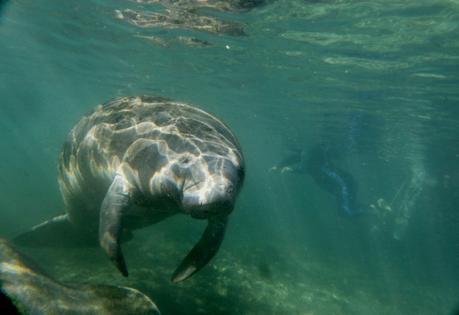Max Chesnes, Tampa Bay Times on Dec 4, 2023

TAMPA, Fla. — For the past two winters, Florida wildlife biologists have experimented hand-feeding lettuce to hungry manatees in the Indian River Lagoon as the animals’ natural food source, seagrass, was in short supply from pollution problems.
This winter, though, there won’t be another feeding trial.
Wildlife experts say there are two main reasons for that decision: There’s enough seagrass in the Mosquito Lagoon — where manatees linger during the colder winter months — for the population to eat this winter, according to an announcement from the Florida Fish and Wildlife Conservation Commission.
The commission also said “there are currently no indications that manatees in this region are in poor or compromised body condition” due to a manatee die-off that began in 2021. A record 1,100 animals died that year, many from starvation in a human-fueled seagrass famine.
A federally designated “Unusual Mortality Event” is still underway for manatees on the Atlantic coast, and the U.S. Fish and Wildlife Service announced in October the agency is reviewing whether manatees should be reclassified as an endangered species.
The decision not to continue feeding manatees comes after state wildlife experts met with staff from the U.S. Fish and Wildlife Service and reviewed data from the previous two winters, according to the Florida wildlife commission.
“After careful consideration, the agencies are not providing manatees with a supplemental food source at the beginning of the winter season,” reads the announcement from Florida wildlife experts. “However, staff developed a contingency plan for supplemental feeding which they will implement if needed.”
Patrick Rose, an aquatic biologist and executive director of Save the Manatee Club, said he supports the decision to end the feeding trial, but added the caveat that there needs to be regular, in-depth monitoring to ensure manatees in the Indian River Lagoon are keeping their health.
“There’s much more vegetation available than there was at the worst part of the Unusual Mortality Event. But there’s still a long ways to go for the system to be fully recovered,” Rose told the Tampa Bay Times in an interview on Monday evening.
“By no means is the Mosquito Lagoon in great shape,” Rose said. “But it’s not at a point where it would be appropriate to continue the supplemental feeding.”
©2023 Tampa Bay Times. Visit at tampabay.com. Distributed by Tribune Content Agency, LLC.
By Chris Nesi
Published Dec. 3, 2023
This version of Romeo and Juliet could have a happy ending.
A pair of aging manatees living in “ever-deteriorating conditions” at a Florida aquarium since 1956 will be relocated following complaints by an animal rights group and a damning report by the USDA about the conditions at the park.
The US Fish and Wildlife Service (FWS) said the manatees, named Romeo and Juliet after Shakespeare’s famous star-crossed lovers, will live out their remaining years in a sanctuary where their medical and social needs can be more carefully attended to, according to the Guardian.
Drone footage captured last month by advocacy group UrgentSeas and posted on X provided a bird’s-eye view of Romeo, 67, living in dismal isolation at the Miami Seaquarium.
In the heartbreaking video, the mammal was shown swimming all by himself in the brackish water of the aquarium’s dilapidated “Pompano Pools,” which are closed off to the public, where the animal rights group said he’s confined “all the time.”
“Manatees are semi-social animals and suffer psychologically when not living in pairs or groups,” read the caption on the video, which had been viewed more than 3 million times.
The release of the footage was part of the group’s #FreeRomeo campaign which had been active on social media.
Former marine mammal trainer and UrgentSeas founder Phil Demers, who has described Romeo’s lonely life as “Groundhog Day in hell,” was overjoyed at the news of the mammals’ imminent freedom.
“It’s a humbling experience to be a part of such a powerful and effective movement. It’s every activist’s dream to inspire change. I’m incredibly proud of the work of UrgentSeas,” he said.
A scathing inspection report by the USDA in July cited multiple failings by the aquarium to provide its animals with proper veterinary care and adequate living facilities.
In one example, after an associate veterinarian’s employment was terminated by the Seaquarium on March 23, a single vet was left to care for the 46 marine animals and “hundreds of birds, fish, sharks and rays housed at the facility,” the USDA wrote in its report.
The inspectors also found the aquarium was out of compliance with requirements to keep “primarily social” animals like manatees housed at all times with “at least one compatible animal of the same or biologically related species.”
As a result of the report, the Miami-Dade Board of Commissioners set a deadline of Dec. 15 for the Seaquarium to address its numerous violations. UrgentSeas had planned to hold a demonstration at the Seaquarium the next day.
A spokesperson for Miami-Dade Mayor Danielle Levine Cava told the Guardian that the Commission had issued a notice of default to The Dolphin Company, the Mexico-headquartered parent of Miami Seaquarium and that it was prepared to exercise its “option to all available remedies within the law” should it fail to meet its deadline to remedy the infractions.
FWS has not revealed the future home of Romeo and Juliet but told the Guardian that it’s looking at facilities that are part of the manatee rescue and rehabilitation partnership, a cohort of accredited aquariums, zoos and marine life centers where the animals can enjoy a vastly improved quality of life.
“FWS takes the health and welfare of manatees in managed care seriously [and is] working with an experienced team of manatee rescue and rehabilitation experts through the MRP to assist with the transport effort of manatees from Miami Seaquarium,” the Service said in a statement to the Guardian.
The mammals are expected to be transported to their new home as early as next week.



No comments:
Post a Comment